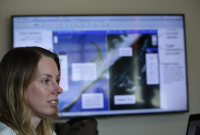Support strong Canadian climate journalism for 2025
A survey suggests that the trust Canadians place in science may be eroding.
The survey, by the polling firm Ipsos for the multinational 3M company, also found that nearly half of those surveyed thought scientists are elitist and that a significant number of respondents discounted findings that don't accord with their personal beliefs.
"While science skeptics represent the minority of Canadians, their number is increasing," said Richard Chartrand of 3M Canada. "This trend is concerning because it shows that distrust is growing."
The Canadian figures are from a global survey of more than 14,000 people between July and September 2018. It's the second year 3M has done the research.
At a time when accelerating climate change and wildlife loss are placing science at the top of the public agenda, the survey found that 32 per cent of respondents were skeptical about it. That was up from 25 per cent the previous year.
"It moved from one person out of four to one person out of three," Chartrand said. "It's difficult for us to understand why."
The study's results were conflicting. While doubt was growing, nine out of 10 respondents said they still trusted research results.
Answers to other questions showed that trust to be wary.
Nearly half — 44 per cent — said they considered scientists "elitists." About one-third felt scientists were influenced by government agendas. Another third thought science has been swayed by corporate agendas.
And 30 per cent said they only believed science that aligned with their personal beliefs.
Other findings have echoed the 3M-Ipsos survey.
A 2017 Leger poll for the Ontario Science Centre found 29 per cent of respondents thought that because scientific theories are subject to challenge, they can't be trusted. Another question suggested 43 per cent considered science to be a matter of opinion.
"It's depressing but not too surprising," said John Smol, an ecologist at Queen's University who has written about the issue. "There's a real disconnect between what scientists do and what is the perception in the public."
Smol fears Canadians don't understand how science works — that data, not belief, is what counts and that science advances when old beliefs are upended, not shored up by unspoken consensus.
"There are certainly misconceptions," he said. "You can't blame them. It's a jungle of misinformation out there."
It's not all the public's fault, said Stephen Johnstone, chairman of earth and atmospheric sciences at the University of Alberta.
"We have to make an effort to communicate in terms that are understandable," he said.
"There used to be an ethic in science that the lower the number of people who actually understood what you did, the better you are doing. That is turning around."
Smol agreed.
"We have a real responsibility to make (science) accessible. We're still doing a relatively poor job of translating the data — by and large paid for by taxpayers — and passing it to the public."
The poll did show curiosity about science. Almost all respondents thought findings should be shared in easily understood language and 88 per cent wished they knew more about science.
"I look at these results and think they're quite positive," said Johnstone. "People appreciate that science is a necessary thing. There's an insatiable appetite for science."
The bridge between the public and the lab must be bridged, said Chartrand.
"There's a clear message in this survey."
This report by The Canadian Press was first published Sept. 23, 2019.






Comments
It is not science per se, or the scientific method that non-scientists distrust so much as it is the all too human impulse of greed that they are right to distrust.
Greed and the wilful perversions of data has been shown to be the operating business model for far too much of the science that touches humanity's dailly lives. Faulty, falsified, glossed over, scientific tests, findings, conclusions in the pharmaceutical and chemical industries have proven the wisdom of questioning everything that arrives on the market as the biggest, best new solution to the Pest problem - whether it is insects, weeds, or pathogens. (Side effects, collateral damage be damned!)
Fracking? greatest invention since the discovery of oil! Deep Sea drilling? Out of sight, out of mind until the oil slicks arrive on our beaches. Splitting the atom? Because we can?
I would not call science/scientists elitists. I call them curious and not especially concerned about potential downsides to their discoveries. But then not all scientists are driven by blind curiosity. Many, these days, are driven by the rapid destruction and disappearance of the biological diversity that they believe lies at the core of the existence of life forms on this planet.
As with all things that have evolved on this planet, infinite complexity is a guiding principle. Diversity, redundancy, is the backstop for the continued existence of what we call life. For life to continue, it is critical to weed out and nullify the rogue elements that seek to destroy it.